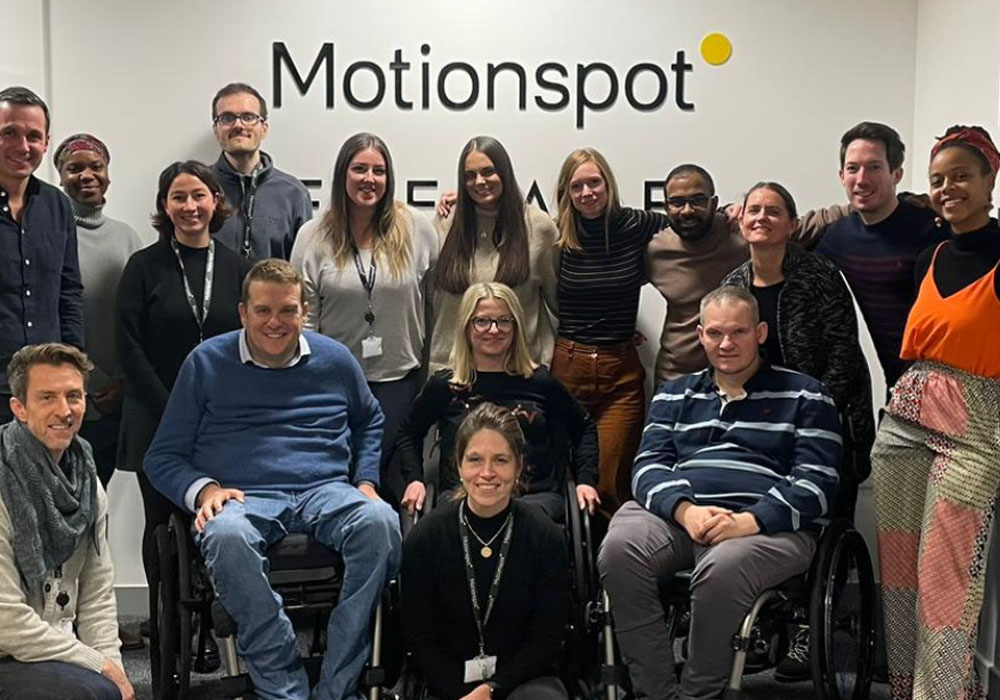Award category:
Motionspot is an inclusive design consultancy that puts people at the heart of building design – creating beautiful, enabling built environments that work for all.
Motionspot was established in 2012 by friends, Ed Warner and James Taylor, after James sustained a spinal cord injury. Together they created a business that demonstrated the beauty of inclusive design and the social and financial benefit of improving accessibility of the built environment.
Over the last 12 years, Motionspot has positively impacted the lives of thousands of disabled people as it developed into an award-winning inclusive design consultancy creating beautiful, accessible homes, hotels, workplaces, retail, later living, education, and public spaces around the world.
Today, Motionspot’s creative and diverse team works to make the built environment more inclusive of people with any protected human characteristic, including disability, neurodivergence, age, race, ethnicity, religion, faith, heritage, gender, and the intersections between them. We drive change with global brands in over 20 countries, such as Barclays, bp, and The National Trust.
Our approach involves working with clients and their design teams through all stages of a development from concept to post-occupancy. This includes engaging building users with lived experience of disability and other protected characteristics to ensure their voices are heard and acted upon, to create accessible and inclusive buildings and spaces for everyone.
We are also active in improving industry best practice and embedding lived experience into the design and construction process. In 2023, Motionspot was a lead steering group member for the revolutionary new guidance for built environment professionals – the Inclusive Design Overlay to the RIBA Plan of Work – a framework that embeds inclusive design across all RIBA stages. Our team has also contributed to the new BSI Design for the Mind PAS 6364 Guide, raising the profile of designing for neurodivergence, and contributed to guidance from the Institution of Structural Engineers highlighting the socio-economic benefits of inclusive building design. In 2024, Co-Founder, Ed Warner, was awarded an MBE for services to disabled people for his work to improve inclusion, including his work as Government Disability Access Ambassador for the Built Environment.
Traditionally, the accessible design of buildings experienced by many disabled people has been functional – the bare minimum of what a person needs to carry out their daily tasks. However, this is not enough for a person to express themselves and reach their full potential. Truly inclusive design is about blending function and form to create spaces which enable and inspire.
This is why Motionspot exists. Since we were founded more than 12 years ago, we have been striving to prove that form and function are not mutually exclusive. In fact, designing in this way from the outset improves the experience and facilities for everyone, as well as being a point of competitive advantage for business. It can offer wonderfully inspired design that creates delighting and memorable experiences for all.
Through the projects we have worked on, from beautiful accessible hotels to offices, Motionspot is making the built environment more inclusive and proving what is possible.
The accessibility of the built environment has come a long way since Motionspot was founded, but there is still so much to do.
In terms of the built environment, we see accessibility in a similar place as sustainability was 10 years ago; a committed community of practitioners demonstrating what is possible and advocating for improvements day in day out; a growing bank of best practice guidelines that will form the basis of legislation; and increasing traction in wider society. However, a concerted effort is still required across the built environment sector to embed inclusive design and lived experiences into all stages of new builds and retrofits as standard.
Motionspot is working with pioneering and progressive clients, that understand the ethical and financial case for embracing inclusion, to create truly uplifting, enabling environments that work for all.
Embedding inclusive design into all stages of new builds and retrofits, both in the public and private sectors, to create safe, welcoming, accessible, and inclusive spaces for everyone.
Inclusive design should also be an essential element of every architectural course, so future generations of designers can understand how our buildings can be consistently designed to serve the communities that use them.
Despite lots of progress, accessibility and inclusive design is still sometimes regarded as an ‘add-on’ or a ‘nice to have’, rather than a core principle and an opportunity to design buildings and spaces for everyone.

Disability Power 100 profile information is self-submitted by the profile subject. Shaw Trust understands and respects that disability and impairment descriptors and language use varies from person to person. Shaw Trust assumes no responsibility or liability for any errors or discrepancies in the content of this, or any other, profile page.